Manic Street Preachers - Send Away the Tigers
by Benjamin Howarth
published: 30 / 6 / 2017
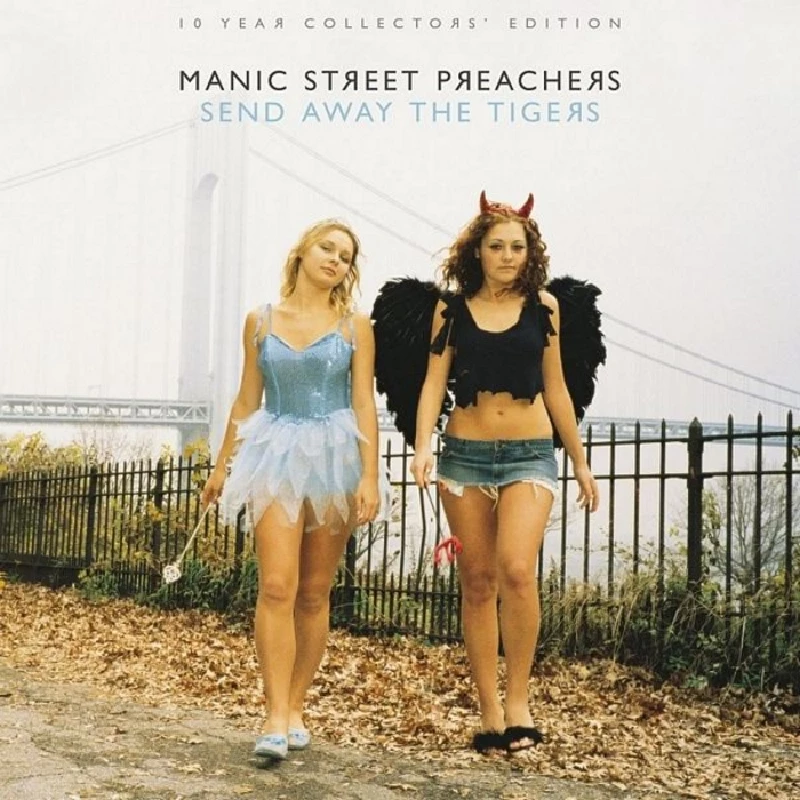
Label:
Select Label
Format: N/A
intro
In our 'Re: View' section, in which our writers examine albums from the past, Ben Howarth reflects on the Manic Street Preachers' 2007 album 'Send Away The Tigers', which has just been re-released in an expanded tenth anniversary edition
Over the past decade and a half, the Manic Street Preachers have alternated between celebrating their impressive legacy and attempting to prove themselves to be a going concern. The 90s revival act who never broke up and never stopped writing new songs. This period has seen them reissue their over-ambitious but fondly looked upon debut ‘Generation Terrorists’, compile two separate Greatest Hits albums (you don’t need both!) and produce anniversary ‘Legacy Edition’ versions of their two undisputed classics, ‘The Holy Bible’ and ‘Everything Must Go’. As if to emphasise just how much these two records loom large in their legacy, they’ve each got the box set treatment twice now – first on their ten-year anniversaries and again on the twentieth. In between all this archiving, however, the band have continued to churn out a consistent run of albums that lose little in comparison with their chart topping days. It is inevitable that the tragedy of Richey Edwards’ disappearance and the emotional intensity it gave the music the band made as they grieved will mean those albums are always seen as the most significant in their career. Yet, this reissue of ‘Send Away The Tigers’ appears designed to do more than give the fans something new to buy. Its purpose seems to be to position the start of a second ‘golden period’ for the band. A time when they released a consistent run of albums, maintained a devoted live following and found a renewed purpose. No longer the weekly music paper’s favourite rent-a-quotes, they continued to strive to bring meaning and purpose to the strange game that is indie rock ‘n’ roll. Does it deserve the ‘anniversary celebration’ repackage? After all, their chart topping, Brit Award winning ‘This Is My Truth…’ didn’t get it. Nor did the unfairly forgotten ‘Lifeblood’. Both those records have been unfairly derided by their own creators, seemingly because of the mood the band was in as they toured them than because of any flaws in the music. Listen to the glorious ‘Be Natural’, the shattering ‘Born A Girl’, the sleek ‘Solitude Sometimes Is’ and the moving ‘Cardiff Afterlife’ if you want proof. ‘Know Your Enemy’, on the other hand, was a mess – an over-reaction to the unfair perception that its predecessor was over-produced. But even this record contains some gems. If any band can keep your attention despite making mistake after mistake, it’s the Manics. And a coasting James Dean Bradfield still trumps almost everybody else. So, it is context as much as quality that sets ‘Send Away The Tigers’ apart from its immediate predecessors. It is no secret that they considered packing the band in after their first ‘Greatest Hits’ album. One of the B-sides from that period was even conceived as the band’s farewell song. In the end, they carried on – probably more because they remained such close friends than because there was a compelling musical reason to do so. But, they were then clearly dismayed that so little attention was paid to their next album (as I have already said, unfairly. It was actually my Album of The Year on this website at the end of 2004.) ‘Send Away The Tigers’ appears to have been a conscious retreat, abandoning the mass market and giving the fanbase exactly what they wanted. Gone were the synths and back was James Dean Bradfield’s Gibson. Gone were the quirky songs about historical figures and back were the angsty, angry anthems. Even the cover seemed designed to rally the most hardcore fans – a picture of two girls in cheap glam outfits (they could have been front of the queue for the London Astoria in December 1994), and those familiar backwards R’s from the cover of the Holy Bible. It all seemed designed to say: “don’t worry. We’ve stopped mucking about with drum machines and echo decks… you’ll like this one.” However, before the album itself was released, the band found themselves back in the Top 10 with their most radio-friendly single in years, along with special guest Nina Perrson on lead vocals. ‘Your Love Alone Is Not Enough’ is a bizarre, gloriously catchy duet that appears to have been both a total accident and highly calculated – it even quotes directly the title of the band’s previous attempt at a anti-ballad pop hit (the inferior ‘You Stole The Sun From My Heart’). There is nothing else quite as audacious as this on the rest of the album – but there are plenty of songs that would have slotted in handsomely on ‘Everything Must Go’. ‘Indian Summer’ even has direct echoes of the melody of ‘A Design For Life’, and the swooping strings on the chorus were clearly designed to have the same spine-tingling effect. If that all sounds a bit too calculated, the wistful nostalgia of its lyric ensures it remains one of the album’s standout moments. We also get a few songs in the clipped, post-punk style of ‘The Holy Bible’, The terse ‘Rendition’ is a protest against the Bush/Blair abuses of suspected terrorists. It’s a textbook angry rant, but a worthy subject to rant about. The song is given a perverse twist with the repeated chorus of ‘Good God I feel like Liberal’. Earlier in their career, the Manics had taken pride in distancing themselves from the fashionable ‘liberal’ causes of their peers. If this seemed designed mainly for shock value, it also reflected one of the band’s strengths – that their politics was, deep down, rooted in the very real experience of the destroyed Welsh mining communities they lived in. The embarrassment at writing about a comparatively predictable subject was real, but it also signalled an end to Nicky Wire’s somewhat embarrassing attempts to adopt unlikely political stances, which saw him veer from justifying the Castro regime to rehabilitating Richard Nixon over the course of the band’s two previous albums. Whatever context it gives to the band’s career, the real strength of ‘Rendition’ is that it rocks. Indeed, the Manics had never been so focussed on uptempo anthemic rock as they were on this album, and to date, they’ve never been so again. All this culminates in the knowingly ridiculous ‘Autumnsong’, with its shameless pillaging of Guns ‘N’ Roses and Queen. The chanted chorus of ‘Baby / What have to you done to your hair / To your hair/ To your hair’ has become one of the most mocked moments in the band’s catalogue – but I can’t help but find it endearing. So, we are left with an album that finds the Manics consciously aiming to present a finished, focused album with nods to all their best-known reference points and deliberate throwbacks to earlier albums. It is a great listen and fully deserves the ‘reissue’ treatment – if only to point some of their lapsed 90s fans back in the band’s direction. This legacy edition delivers ample value for those who already have the album on their shelves. But it also finds the band rewriting history, substituting a song that was originally a B-side for one of the original album tracks. The new entry, ‘Welcome To The Dead Zone’ probably deserved to be on the album. A Sean Moore composition (which in itself ensures that many Manics fans will cherish it; the softly spoken drummer has always been held in high esteem), it broadens the pace and tone of the ten tracks. Although, as all the other B-sides from the period are included anyway, there seems no special logic to elevating it to ‘full album’ status. We therefore have the prospect of the original track-two, ‘Underdogs’, being written out of history. Beginning with a snarled ‘This One’s For The Freaks…’, it was the most blatant sign of the band’s initially ambition to reconnect with their diehard audience. Instead, the rest of the album seemed to reaffirm the band’s status as a ‘national treasure’ capable of having genuine hits – and in the context of an album that achieved almost the opposite of what was imagined for it, it makes sense to jettison the song that doesn’t fit. The lyric has a crude, Marilyn Manson-esque tone and (as weird as it is to retrospectively edit an album), the new track listing is an improvement. Elsewhere, we get some strong stuff. ‘Leviathan’, a two-minute blast of feeling, was released a year before this album on a War Child compilation, and deserves to be heard more widely. Other B-sides from the period are also relatively strong (even if ‘...Dead Zone’ was very much the standout) and it's notable that the best tend to come from the album’s final single (‘Indian Summer’), a sign that the surprise return to the Top 10 had reinvigorated the band. ‘Heyday of the Blood’ in particular is bursting with ideas, while even the Nicky Wire solo songs are relatively listenable (though his chalk ‘n’ cheese vocals will always have some people reaching for the skip button). Like most bonus material, it’s not uniformly good – nobody needs to hear the Manics covering Rihanna’s ‘Umbrella’. But there is plenty here to amuse, and a full set of demo recordings show you how focused the Manics were on this one (less of the studio tinkering and re-writing than on their last album). You won’t play these over the finished recordings, but if you are the sort of person who wants to buy the same album twice, this kind of fare is exactly what you will be after. Finally, there is a DVD of an exhilarating Manics performance in the tent at Glastonbury. For a band who had previously headlined the main stage, this could have been seen as a relegation. Instead, it is a triumph; an emphatic statement of the Manics as one of the great live acts of their age. Like all Manics shows, it has all the hits and a few new ones from this album. You’ll go back to this concert film even if you already have the DVDs of their 1996 Manchester show and 2000 New Year’s Eve triumph. ‘Send Away The Tigers’ is rightly remembered fondly by the Manics, and they have done it justice with this reissue. Perhaps its lasting significance, though, is that it reaffirmed the band’s sense of themselves. Having won so much acclaim for this album, they were able to begin work on setting Richey Edwards’ final book of lyrics to music – an exercise that might have been greeted with accusations of desperation if this album hadn’t been such a success. That the album of Richey lyrics, ‘Journal For Plague Lovers’ does not overshadow its predecessor, however, shows just what a rich vein of form the band were on when they made ‘Send Away The Tigers’. An essential package for diehards and lapsed fans alike.
Track Listing:-
Also In Raging Pages
Alice Cooper (2015)
Beatles (2022)
Benjamin Orr (2018)
Bernard Purdie (2015)
Billy Bragg (2017)
Billy J. Kramer (2016)
Bob Boilen (2016)
Bob Dylan (2018)
Bob Marley (2019)
Brian Wilson (2017)
Byrds (2024)
Carl Ewens (2025)
Cher (2025)
Clive Davis (2015)
Common (2020)
Damned (2021)
Don Short (2020)
Donovan (2022)
Elliott Murphy (2019)
Elvis Costello (2015)
Felix Cavaliere (2022)
Flip Side (2025)
Frank Sinatra (2023)
Frank Zappa (2017)
Gary Wright (2014)
Gene Simmons (2015)
Geoff Emerick (2018)
George Harrison (2022)
Graham Nash (2023)
Green Day (2019)
Holger Czukay (2025)
Ian Mclagan (2016)
Iron Maiden (2014)
Jann Wenner (2019)
Jerry Lee Lewis (2015)
Jerry Nolan (2018)
Jim Summaria and Mark Plotnick (2019)
Jimmy Webb (2022)
Joe Perry (Aerosmith) (2014)
John Lennon (2017)
Kinks (2014)
Lani Hall Alpert (2019)
Laurence Juber (2014)
Liberty DeVitto (2021)
Lisa Robinson (2021)
Lita Ford (2021)
Little Anthony (2014)
Louise Harrison (2015)
Luke Haines (2024)
Mary Wilson (2021)
Michael Bloomfield (2020)
Michael Dorf (2019)
Miscellaneous (2014)
Ozzy Osbourne (2014)
Pamela Des Barres (2017)
Paul McCartney (2020)
Radiohead (2022)
Renee Rosen (2018)
Richard Balls (2018)
Rick Wakeman (2023)
Ringo Starr (2015)
Robby Krieger Band (2022)
Roger Daltrey (2020)
Rolling Stones (2016)
Ronnie Wood (2015)
Roy Bond (2023)
Sam Phillips (2018)
Sean Madigan Hoen (2014)
Silas House (2020)
Spencer Vignes (2017)
Spirit (2023)
Suzi Quatro (2023)
Sylvain Sylvain (2018)
Thin Lizzy (2016)
Tommy James (2021)
Tommy Mottola (2025)
Tori Amos (2020)
U2 (2021)
Who (2014)
Will Romano (2015)
Woody Woodmansey (2018)
Zz Top (2014)
Band Links:-
https://www.manicstreetpreachers.com/https://www.facebook.com/manicstreetpreachers/
https://twitter.com/Manics
https://en.wikipedia.org/wiki/Manic_Street_Preachers
Picture Gallery:-
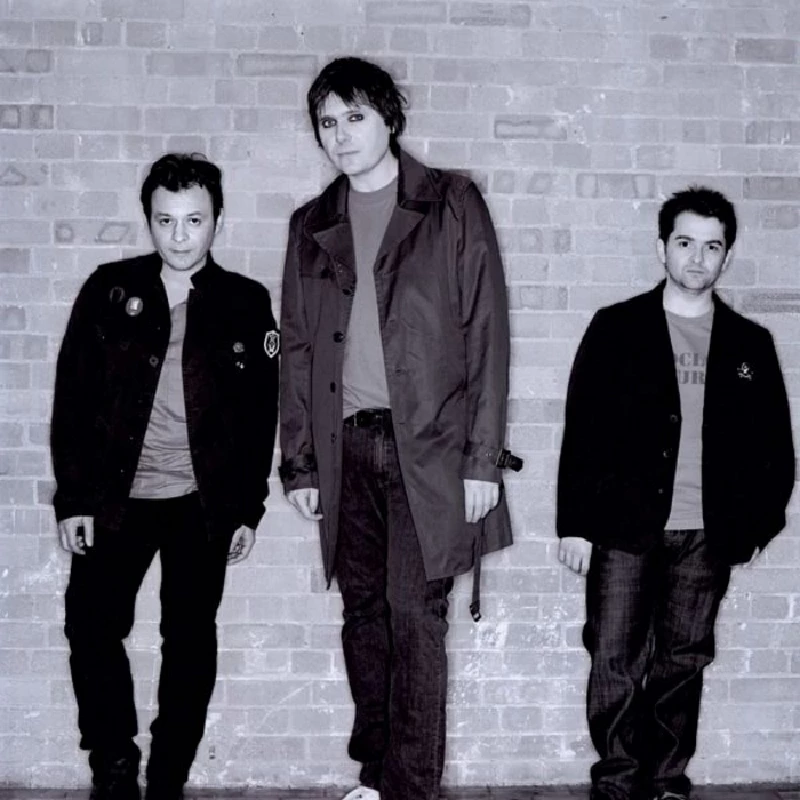
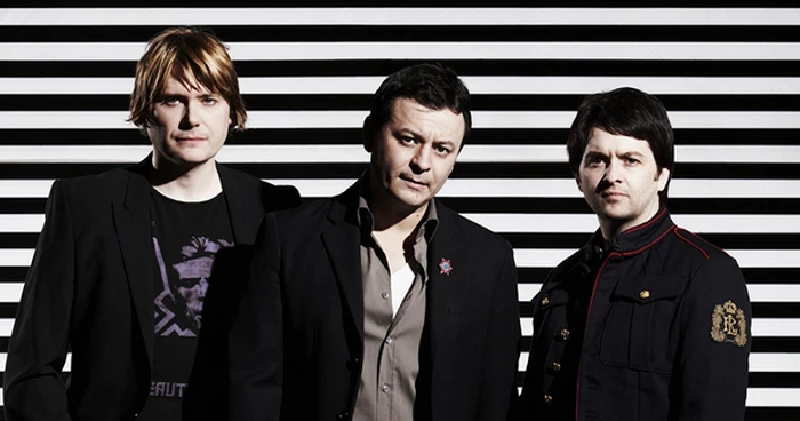
favourite album |
|
Everything Must Go (2016) |
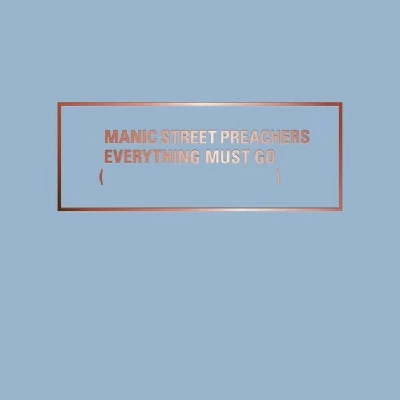
|
| In our 'Re:View' section, in which we look back at albums from the past, Mary O'Meara wanders back through the years to examine why the Manic Street Preachers' 'Everything Must Go', which is about to be re-released, is such a monumental and life-affirming record |
features |
|
(Gig of a Lifetime) Millennium Stadium, Cardiff, December 1999 (2014) |

|
| In 'Gig of a Lifetime' Mary O'Meara reflects on the Manic Street Preachers' infamous New Year's Eve gig in 1999 at the then just opened Millennium Stadium in Cardiff |
photography |
|
Photoscapes (2019) |

|
| Andrew Twambley photographs the Manic Street Preachers at the first of two gigs at the Manchester Ritz as part of a UK tour to celebrate the 20th Anniversary of their 1998 sixth album , 'This Is My Truth Tell Me Yours'. |
reviews |
|
Lifeblood (2004) |
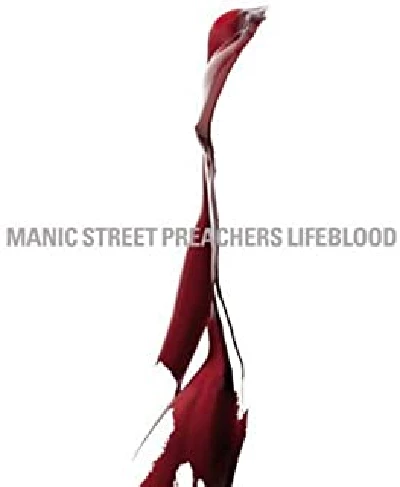
|
| Welcome return from the Manic Street Preachers, whose seventh album proves to be their best since 1996's 'Everything Must Go' |
most viewed articles
current edition
Carl Ewens - David Bowie 1964 to 1982 On Track: Every Album, Every SongArmory Show - Interview with Richard Jobson
John McKay - Interview
Colin Blunstone - Thalia Hall, Chicago, 16/7/2025
Billie Eilish - O2 Arena, London, 10/7/2025
Bathers - Photoscapes 1
Visor Fest - Valencia, Spain, 26/9/2025...27/9/2025
Loft - Interview
Sir Tim Rice - Interview
Robert Forster - Interview
previous editions
Manic Street Preachers - (Gig of a Lifetime) Millennium Stadium, Cardiff, December 1999Heavenly - P.U.N.K. Girl EP
Beautiful South - Ten Songs That Made Me Love...
Peter Perrett - In Dreams Begin Responsibilities Interview Part One
Boomtown Rats - Ten Songs That Made Me Love....
Oasis - Oasis, Earl's Court, London, 1995
Coldplay - Wembley Arena. London, 16/8/2022
Trudie Myerscough-Harris - Interview
Prolapse - Interview
Pixies - Ten Songs That Made Me Love...
most viewed reviews
current edition
Davey Woodward - Mumbo in the JumboSick Man of Europe - The Sick Man of Europe
Lucy Spraggan - Other Sides of the Moon
Phew, Erika Kobayashi,, Dieter Moebius - Radium Girls
Suzanne Vega - Flying With Angels
Amy Macdonald - Is This What You've Been Waiting For?
Bush - I Beat Loneliness
Blueboy - 2
Alice Cooper - The Revenge of Alice Cooper
Cynthia Erivo - I Forgive You
Pennyblackmusic Regular Contributors
Adrian Janes
Amanda J. Window
Andrew Twambley
Anthony Dhanendran
Benjamin Howarth
Cila Warncke
Daniel Cressey
Darren Aston
Dastardly
Dave Goodwin
Denzil Watson
Dominic B. Simpson
Eoghan Lyng
Fiona Hutchings
Harry Sherriff
Helen Tipping
Jamie Rowland
John Clarkson
Julie Cruickshank
Kimberly Bright
Lisa Torem
Maarten Schiethart